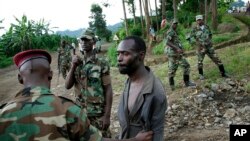South Africa says military intervention by its contingent of United Nations peacekeepers is now “inevitable” after Rwandan rebels in the Eastern Democratic Republic of Congo did not comply with a January 2 deadline to disarm.
In a terse statement released this week, South Africa’s foreign ministry said it had no remaining non-military options against the Forces Démocratiques pour la Libération du Rwanda (FDLR), which has sown havoc in the mineral-rich eastern region of DRC.
“South Africa reiterates that the FDLR has failed to comply with the 2 January 2015 deadline set by the Heads of State and Government of Southern African Development Community and the International Conference on the Great Lakes Region for the FDLR to disarm voluntarily or face military action, and has therefore rendered military option inevitable,” the statement read.
The announcement of a forced disarmament is the latest salvo in a seemingly unending conflict that has killed untold numbers of people and seen countless egregious human rights violations by armed groups on all sides.
Eastern DRC has been mired in bloody guerrilla-style combat since 1994, when Rwanda’s genocide spilled over the border. Key members of the FDLR leadership have connections to the genocide in Rwanda.
Disarmament resistance
So far, voluntary disarmament of the various armed groups in the area has had miserable results, provoking top U.N. officials to declare in a statement that: “The FDLR has used this six-month grace period to continue to commit human rights abuses against innocent people in Eastern DRC, recruit combatants, and champion its illegitimate political agenda.”
The only tactic that seems to have worked so far is brute force — seen in 2013 when DRC's army, backed by U.N. forces, routed the dangerous M23 rebel group after it exhausted numerous opportunities for a political solution.
The UN peacekeeping mission in Congo is one of the world’s largest and costliest, with an annual budget of just under $1.4 billion and 22,000 uniformed staff from Malawi, South Africa and Tanzania.
Action may be immiment
When asked about potential battle plans, Farhan Haq, a deputy spokesman for the secretary-general, told reporters at U.N headquarters that the peacekeeping mission would not release plans ahead of a strike.
“It’s not something we’d announce in advance of the actual operation,” he said.
On Tuesday, Angolan officials announced that they would cancel a summit scheduled for January 15-16 on the topic, a move that some analysts say could pave the path for military action.
Angola’s Minister of International Affairs, Joaquim do Espirito Santo, seemed to confirm that in a statement about the cancellation, saying "the summit will not be held because the decision to take military action against the FDLR has already been made and all that remains now is to implement it.”
Analyst Stephanie Wolters of the Pretoria, South Africa-based Institute of Security Studies, noted that the deadline has already been extended once, and that it is time to act.
“Simply extending the disarmament deadline again will only prolong the agony and discredit the organization,” she said in an analysis of the situation on the think tank’s site.
And so it seems that battle lines are being drawn.
Late last week, the head of the United Nations Organization Stabilization Mission in the Democratic Republic of the Congo, Martin Kobler, sent out an upbeat message to peacekeepers — which could also be read as a warning to FDLR rebels.
“I am confident about the engagement of the troops in the upcoming operations against the FDLR,” he said.
An earlier version of this article inaccurately stated that the FDLR rebel group is backed by the Rwandan government. The FDLR includes among its ranks Rwandan Hutu militants who took part in that country's 1994 genocide. VOA regrets the error.




